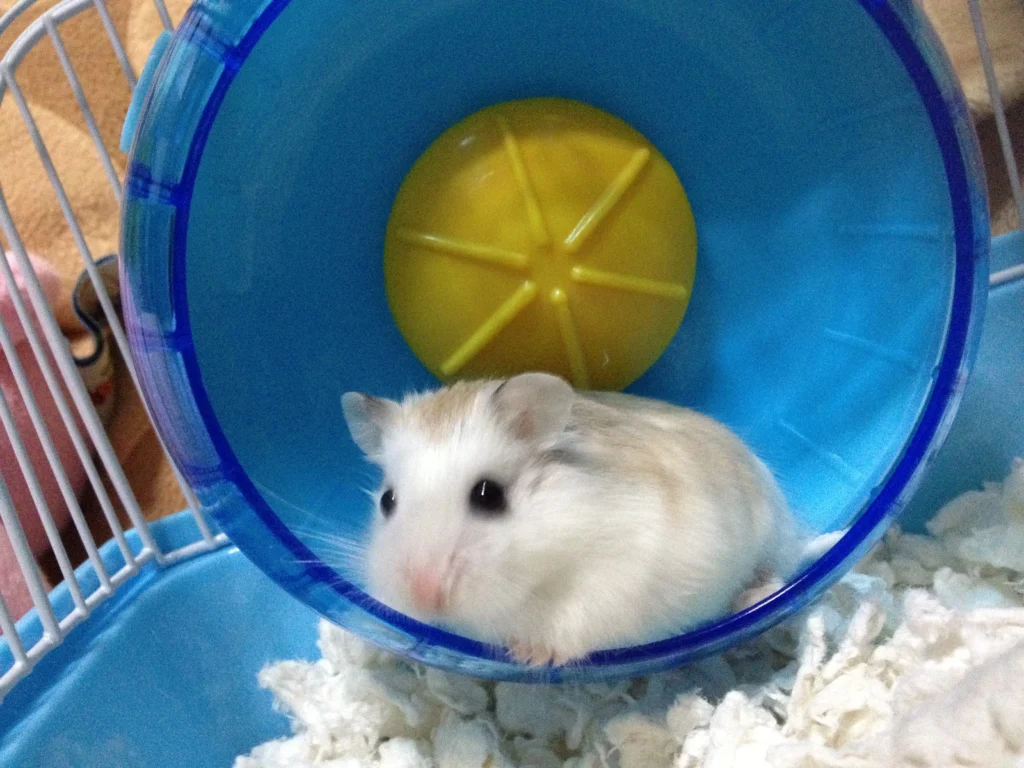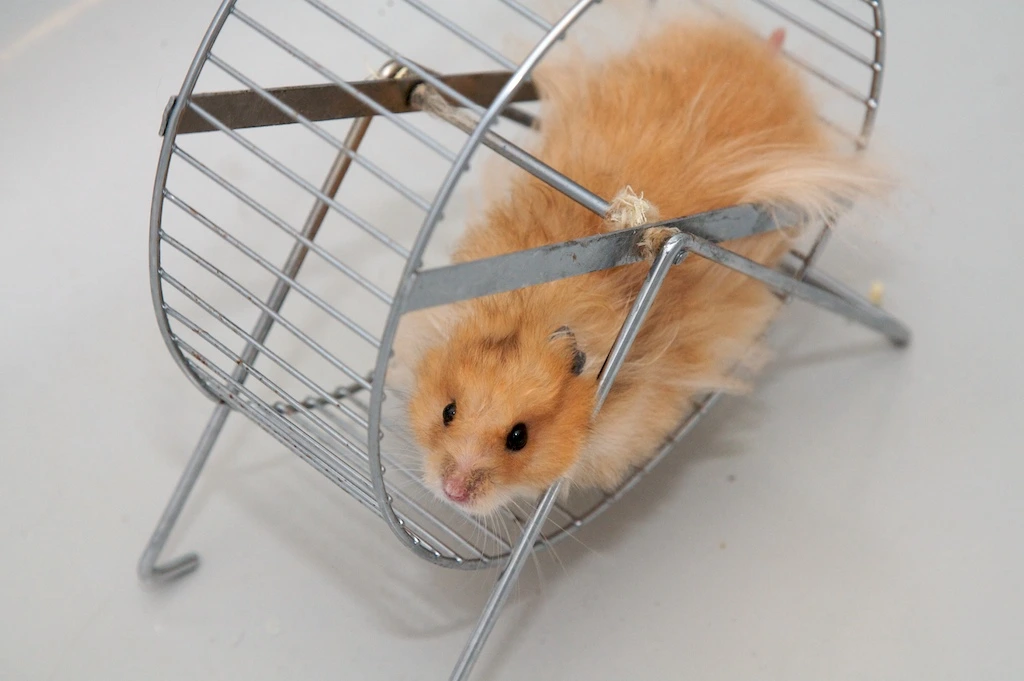Introduction
Hey, fellow pet pals! If you’ve ever had the joy of sharing your home with a pint-sized ball of fur – a hamster, that is – you’ll know the warm fuzzies they bring to your life.
These little critters may be tiny, but they pack a punch of cuteness and charm.
Now, let’s dive into the world of hamster health, peek into common health issues in hamsters, and uncover why being a health-savvy hamster parent is the real deal.
What are Hamsters?
Imagine a creature so small, it fits right in your hand, yet so big in heart that it fills your life with boundless joy.

That’s my buddy, the hamster! These adorable furballs measure about 4 to 7 inches long and come in all sorts of colors and breeds.
With their twinkly whiskers and cozy fur coats, they’re like happiness wrapped up in a tiny package.
Common Health Issues In Hamsters
Now, I’m not trying to spook you, but hamsters have their own share of health challenges.
Let’s look at some of the speed bumps they might encounter on their little life journey:
- Respiratory Hiccups: Yep, even our tiny friends can catch a cold. If your hamster starts sneezing, coughing, or seems to be having trouble breathing, they might have a little respiratory infection going on.
- Dental Adventures: Imagine if our teeth never stopped growing! Hamsters deal with that reality, and it can lead to overgrown teeth or misaligned jaws. If you spot them struggling to munch their munchies or drooling more than usual, a dental check-up might be in order.
- Wet Tail Woes: Not the latest dance move, I promise. Wet tail is a serious condition caused by stress and bacteria. Look out for symptoms like diarrhea, a hunched posture, and a wet, well, tail.
- Skin Sagas: Just like we get itchy now and then, hamsters can have their share of skin struggles. If their fur starts looking patchy or they’re scratching like mad, it could be due to mites or other skin critters.
Why Your Hamster’s Health Matters
Now, let’s get to the heart of the matter. Why should you care so much about your furball’s health?
Well, think about it – your hamster depends on you for everything, from yummy treats to cozy bedding.

Being clued in about hamster health means you can spot any hiccups early on and give your furry sidekick a fighting chance at a long, happy life.
Plus, a healthy hamster means more cuddles, more playdates, and more of those precious memories that warm your heart.
By being in tune with their needs and staying vigilant about their well-being, you’re not just a hamster parent – you’re a hamster hero!
So, go on, shower your fur buddy with extra love, treats, and maybe even a teensy hammock for the ultimate lounging experience.
Common Health Issues In Hamsters
Now let’s discuss about some of the most common health hiccups these adorable critters might face and how you can steer them toward a healthy and happy life.
1. Wet Tail
If your hamster suddenly looks droopy, has diarrhea, and, well, a wet bottom. It’s not just a messy situation; it might be wet tail – a stress-induced bacterial infection. A vet’s visit is a must for this one!
2. Diarrhea
We’ve all been there, and so have hamsters. If your fur friend’s poop gets unusually runny or frequent, it’s time to give the vet a call. Dehydration can be a real concern here.
3. Constipation
On the flip side, constipation can be a hiccup too. If your hamster’s doing less poop-dropping than usual, and they seem uncomfortable or bloated, it’s time to address the issue.
4. Respiratory Infections
If your hamster sneezing or wheezing – it’s not cute, it’s a red flag. Respiratory infections can strike these tiny creatures, leading to breathing issues. Timely vet care is a breath of fresh air here.
5. Diabetes
Yes, hamsters can be sugar-sensitive too. Increased thirst, weight loss, and frequent urination might point to diabetes. A vet can help you navigate this sweet trouble.
6. Overgrown Teeth
Hamsters’ teeth are like a never-ending story – they keep growing! If your furball’s not gnawing enough, those chompers can overgrow and cause trouble. A vet can trim them down to size.
7. Skin Problems
When your hamster starts scratching like they’re auditioning for a scratching competition, it’s time to investigate. Mites, allergies, or other critters might be at play here.
8. Eye Problems
Hamsters’ tiny eyes can run into big problems. If you spot crustiness, redness, or discharge, it’s time to let a vet cast their expert eye on the issue.
9. Ear Problems
Hamsters rely on their ears for a lot, and ear problems can be a real dampener. If you notice your hamster shaking their head excessively or scratching at their ears, a vet’s insight is invaluable.
10. Cancer
Even hamsters aren’t immune to this dreaded word. Tumors might show up as unusual lumps or bumps. A vet’s guidance can help you navigate the way forward.
Remember, these cute critters rely on you for their well-being. Knowing the signs and staying proactive about their health can ensure you’re the hero of their story.
So, here’s to a healthy, happy, and utterly hamster-tastic journey ahead!
Hamster Care
If you’ve welcomed a furry bundle of joy into your life, you’re in for a wild ride of cuteness and companionship. But hey, being a hamster parent comes with responsibilities.

Fear not! Let’s dive into the world of hamster care – from setting up their dream home to keeping them healthy and entertained.
How to Set Up a Hamster Cage
Creating a cozy and safe haven for your hamster is your first step to becoming their best friend. Here’s how to set up a Hamster Cage:
- Choose the Right Cage: Go for a spacious, well-ventilated cage with horizontal bars for climbing. Aquariums with proper lids work well too.
- Bedding Bonanza: Line the cage with suitable bedding like aspen shavings or paper-based bedding. Aim for around 2-3 inches deep – perfect for tunneling and burrowing.
- Nesting Nook: Add a cozy hideout for your hamster to snooze in. A small cardboard box or a specially designed hamster house will do the trick.
- Wheel Delight: Provide a solid, appropriately sized wheel for exercise. Hamsters love their cardio!
- Chew Toys Galore: Hamsters are chewaholics. Include safe wooden toys to keep those teeth in check.
- Climbing Fun: Add platforms, ramps, and tunnels for a mini-playground. Hamsters love to explore.
What to Feed Hamsters
A well-fed hamster is a happy hamster. Here’s a menu to keep their tiny tummies content and reduce the risk of common health issues in hamsters.

- Hamster Pellets: These provide balanced nutrition. Look for high-quality, species-specific pellets at your pet store.
- Fresh Veggies: Offer small portions of fresh veggies like carrots, broccoli, and bell peppers. Variety is key.
- Protein Punch: Hamsters need protein. Serve up some cooked chicken, boiled egg, or small amounts of mealworms.
- Fruit Treats: A slice of apple or a nibble of banana once in a while adds a touch of sweetness.
- Hydration Help: Fresh water is a must. Use a sipper bottle to keep it clean and accessible.
How to Play with Hamsters
Bonding time with your furball is essential. Here’s how to keep them entertained and social:

- Hand Taming: Spend time around your hamster, letting them get used to your presence. Slowly offer treats from your hand.
- Safe Exploration: Create a hamster-proof play area outside the cage for supervised exploration. Empty bathtubs work well!
- Interactive Toys: Invest in tunnels, hamster balls, and puzzle toys to engage their curious minds.
How to Prevent Hamster Health Problems
Prevention is the name of the game when it comes to your hamster’s well-being:
- Cleanliness Counts: Regularly clean the cage, change bedding, and remove uneaten food to prevent bacteria buildup.
- Temperature Check: Keep the cage away from direct sunlight and drafts. Hamsters prefer temperatures between 65-75°F (18-24°C).
- Regular Vet Visits: Schedule routine check-ups to catch any potential health issues early on.
- Exercise Enthusiasm: Provide plenty of opportunities for exercise through toys, wheels, and playtime outside the cage.
- Healthy Diet: Feed them a balanced diet and limit sugary treats to prevent obesity and diabetes.
With these care tips under your belt, you’re well on your way to being the ultimate hamster guardian.
From setting up their cozy home to enjoying playdates, you’re creating a life filled with love, fun, and adorable hamster shenanigans.
Your furry friend will be forever grateful for the care and happiness you provide!
Hamster Treatment and Health
Your furry friend brings boundless joy, but sometimes they might hit a bump on the health road.

Don’t fret – I’m here to guide you through the steps of providing the best possible care when your little companion isn’t feeling their best.
What to Do If Your Hamster Is Sick
First things first, trust your instincts. You know your hamster better than anyone else. If you notice any of the following signs, it’s time to take action:
- Change in Behavior: Is your normally active hamster suddenly lethargic or uninterested in their favorite activities?
- Appetite Changes: If they’re eating significantly less or more than usual, something might be off.
- Breathing Issues: Wheezing, rapid breathing, or any difficulty in breathing calls for attention.
- Diarrhea or Constipation: Unusual changes in their bathroom habits are worth investigating.
- Skin or Fur Changes: Bald patches, scabs, or excessive scratching could indicate a problem.
When to Take Your Hamster to the Vet
Sometimes, expert help is the best solution. Here’s when you should make that trip to the vet:
- Emergency Situations: If your hamster is bleeding, struggling to breathe, or experiencing severe distress, don’t hesitate – head to the vet immediately.
- Persistent Symptoms: If your hamster’s condition doesn’t improve after a day or two, it’s time to consult a professional.
- Unexplained Weight Loss: Sudden weight loss without a clear reason is a red flag.
- Infections or Injuries: Any sign of infection or injury should be treated promptly to avoid complications.
Treatments For Common Health Issues In Hamsters
Your vet will tailor treatments to your hamster’s specific condition, but here are some common interventions:
- Antibiotics: For bacterial infections, your vet might prescribe antibiotics. Administer them as instructed.
- Fluids: In cases of dehydration or illness, your hamster might need fluids either orally or through subcutaneous injections.
- Pain Relief: If your furry friend is in pain, pain-relief medications might be prescribed.
- Topical Treatments: For skin issues, your vet might recommend creams or ointments.
- Surgery: In severe cases, surgical interventions might be necessary, especially for tumor removal or dental issues.
Remember: You’re not alone in this journey. Always consult a veterinarian who’s experienced with small animals, as hamsters have unique needs.
Diagnosing Hamster Health Woes and Vet Tests
Sometimes, our little furballs face health hurdles. But fear not, for understanding the diagnostic journey and the tests your vet might perform can empower you to be the best advocate for your hamster’s well-being.
How to Diagnose Hamster Health Problems
Observation is your secret weapon. Keeping a keen eye on your hamster’s behavior and habits can clue you in on potential problems.
Here’s how to play detective:
- Behavioral Changes: Is your normally active hamster becoming lethargic or withdrawn? A sudden shift in behavior might signal an issue.
- Appetite and Thirst: Keep an eye on their eating and drinking habits. Significant changes might be telling.
- Breathing Patterns: Notice their breathing rate and if they seem to be struggling or wheezing.
- Physical Changes: Regularly check their fur, eyes, ears, and skin for any unusual signs like bald spots or redness.
What Tests Your Vet May Need to Run
When your hamster isn’t feeling their best, your vet might recommend certain tests to get to the root of the problem:

- Physical Examination: Your vet will start by giving your hamster a thorough once-over, checking for any visible issues.
- Blood Tests: These help determine overall health, uncovering potential infections or imbalances.
- Fecal Analysis: A stool sample can reveal parasites, bacterial infections, or digestive issues.
- X-rays: These can show problems like fractures, tumors, or respiratory concerns.
- Ultrasound: A non-invasive way to examine internal organs and detect possible blockages.
- Dental Exam: If dental issues are suspected, your vet might take a closer look at your hamster’s teeth.
- Biopsy: In cases of lumps or unusual growths, a tissue sample might be taken for further examination.
Remember, your vet will tailor their approach based on your hamster’s specific symptoms and needs.
Being open about any observations you’ve made will help them make an accurate diagnosis.
Conclusion: A Happy Hamster and a Happy You
Hey there, fellow hamster pals! We’re reaching the end of our guide on common health issues in hamsters, but don’t worry – the adventure with your fluffy sidekick is just beginning.
Let’s sum up all the good stuff you’ve learned about keeping your hamster healthy and happy, and where to turn for more info.
Tips for a Healthy Hamster
- Comfy Home Sweet Home: Make your hamster’s habitat cozy and exciting with the right bedding, fun toys, and lots of space to roam.
- Nom Nom Balance: Keep their tummies smiling with yummy pellets, fresh veggies, and treats that keep them fueled and feeling fine.
- Vet Visits Rock: Don’t forget those check-ups! Regular trips to the vet can catch any health hiccups before they turn into big deals.
- Clean Scene: Keep their place tidy and comfy – new bedding, clean cage, and no mess will make them wag their tails.
- Play and Chill: Spend time together! Play, cuddle, and chat to create a bond that’ll warm your heart.
- Spot the Clues: Watch them closely – their behavior, eating habits, and looks can tell you lots about their health.
- Quick Action: If you think something’s up, don’t wait. Get your furball to the vet pronto for some TLC.
More to Explore
- Vet’s Wisdom: Your local vet, especially one who’s a hamster pro, is your go-to for all things hamster health.
- Online Hangouts: Jump into hamster-loving online groups and forums where fellow hamster fans swap stories and tips.
- Books of Wisdom: Check out hamster care books for in-depth info on all things hamster.
- Pet Store Helpers: Your friendly local pet store folks can dish out advice and suggest cool hamster gear.
- You can explore further information on RSPCA or ASPCA related to your pet.
Remember, every hamster’s personality shines, and your journey as a hamster parent is filled with laughs, cuddles, and new discoveries.
Your love and care will create a life of pure joy for you and your hammie. So here’s to giggles, snuggles, and a whole lot of hamster happiness!
FAQs
Q1: What are some common health problems that hamsters can experience?
Hamsters can be prone to various health issues, including respiratory infections, dental problems, gastrointestinal disorders, skin conditions, and tumors.
Q2: How can I tell if my hamster is sick?
Signs of illness in hamsters may include lethargy, weight loss, changes in appetite, difficulty breathing, discharge from the eyes or nose, hunched posture, changes in fur appearance, and behavioral changes.
Q3: What should I do if I suspect my hamster is sick?
If you notice any signs of illness, it's important to consult a veterinarian experienced in treating small animals. Early intervention can be crucial for your hamster's health.
Q4: Can hamsters get respiratory infections?
Yes, hamsters can develop respiratory infections, often caused by bacteria or viruses. Symptoms may include sneezing, wheezing, labored breathing, and discharge from the eyes or nose.
Q5: Do hamsters have dental problems?
Hamsters' teeth continually grow, and if not properly worn down through chewing, they can develop overgrowth, leading to dental issues and difficulty eating.
Q6: Are hamsters susceptible to skin problems?
Yes, hamsters can experience skin issues like mites, fungal infections, and fur loss. Regular grooming and maintaining a clean environment can help prevent these problems.
Q7: Can hamsters get tumors?
Yes, hamsters are prone to developing tumors, especially as they age. These growths can be benign or malignant and may require surgical intervention.
Q8: How do I prevent obesity in hamsters?
Providing a balanced diet and appropriate portion sizes, along with encouraging exercise through a well-equipped habitat and safe playtime, can help prevent obesity.
Q9: Are hamsters prone to diarrhea or other digestive problems?
Yes, hamsters can experience digestive issues like diarrhea, which may be caused by dietary changes, stress, or underlying health problems. Maintaining a consistent diet and clean habitat can help prevent such issues.
Q10: Can hamsters develop diabetes?
Yes, hamsters can develop diabetes, which may lead to increased thirst, urination, and weight loss. Maintaining a proper diet and weight can help reduce the risk.
